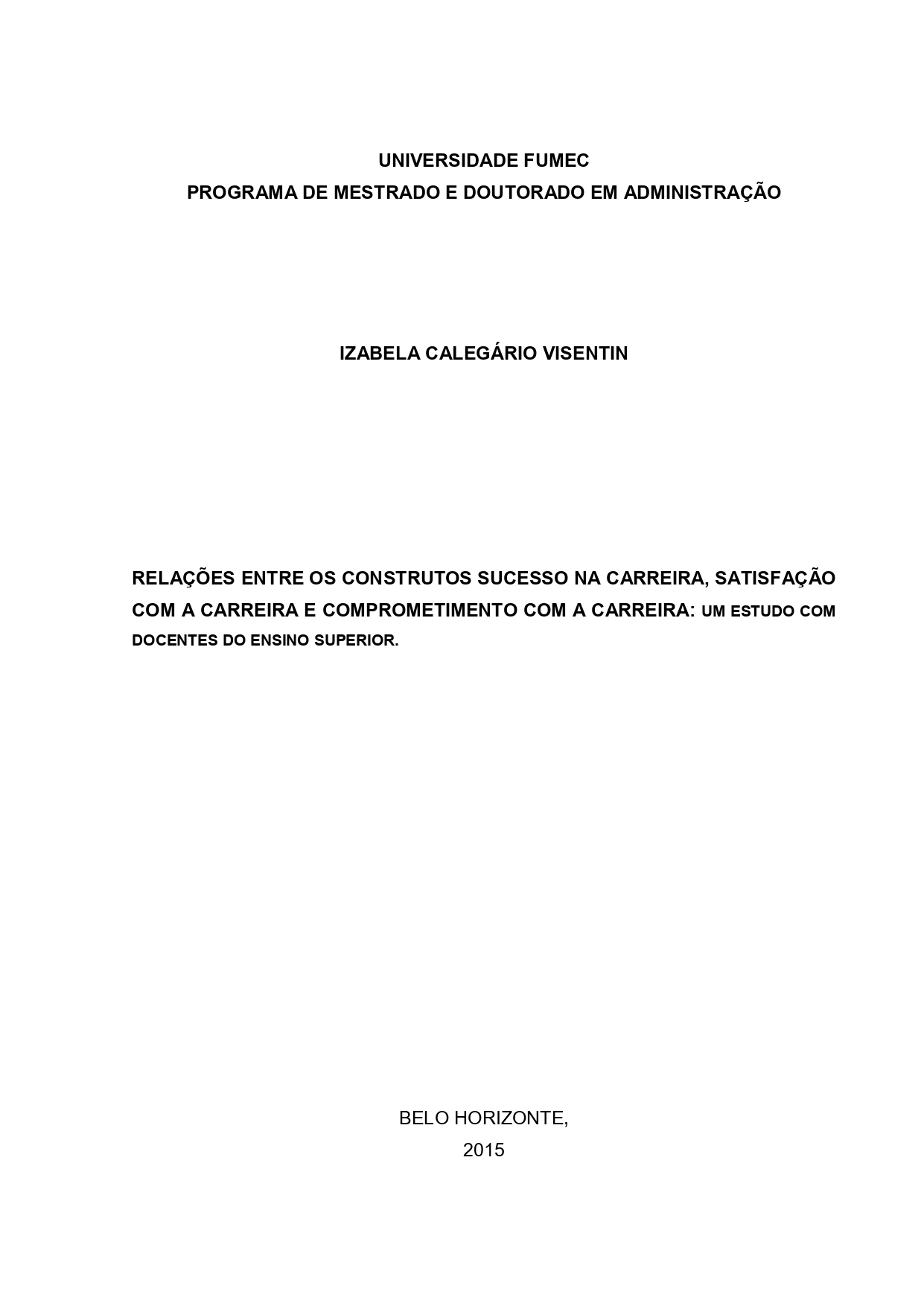Relações entre os construtos sucesso na carreira, satisfação com a carreira e comprometimento com a carreira: um estudo com docentes de ensino superior

Visualizar/
Data
2015Autor
Visentin, Izabela Calegário
xmlui.mirage2.itemSummaryView.MetaData
Mostrar registro completoResumo
Esta tese contempla a temática da gestão de carreiras no contexto contemporâneo
no qual ocorrem profundas mudanças na natureza no mundo do trabalho com
reflexos nas trajetórias profissionais, com base em Hall (2002), Inglehart e Welzel
(2005) e Savickas, (2012). O estudo apresenta novas concepções que se
caracterizam pelo protagonismo do indivíduo na gestão de sua carreira e pela
valorização da carreira sob uma perspectiva mais subjetiva trazendo à tona, por
conseguinte, os conceitos de sucesso objetivo, sucesso subjetivo, satisfação e
comprometimento com a carreira. Assim, esta pesquisa teve o intuito de observar se
existem possíveis associações ou interseções entre esses construtos, hipotetizando
que possam estar interrelacionados, conforme estudos de Poon (2004), Ballout
(2009), Aryee e Tan (1992), Aryee e Debrah (1993), Goulet e Singh’s (2002), Day e
Allen (2004), Fu (2010), Myrtle et al. (2011) e Kong et al. (2012). Adota o método
quantitativo sob o formato da modelagem de equação estrutural, criando e
analisando dois modelos para testar suas hipóteses, em especial, para a categoria
profissional do docente do ensino superior no Brasil. Os resultados indicam que a
satisfação com a carreira influencia o comprometimento com a carreira e que a
satisfação com a carreira e o comprometimento com a carreira influenciam
positivamente o sucesso subjetivo e, por fim, que a satisfação com a carreira
influencia também o sucesso objetivo. Ou seja, se o docente do ensino superior
sente que tem satisfação com a carreira, ele tenderá a ser Também se o docente é comprometido e satisfeito com sua carr enireala e lceo tmenpdroemráe ati dteor.
uma percepção de sucesso subjetivo. Esse tipo de sucesso é, assim, de natureza
subjetiva, não se relacionando com recompensas financeiras e, sim, com a
identificação com o trabalho que se desenvolve. Ressalta-se, assim, a contribuição
desta tese para a academia, com a proposição de um modelo robusto que relaciona
os construtos satisfação com a carreira, comprometimento com a carreira e
percepção de sucesso (subjetivo e objetivo) na carreira, embasado teoricamente -
por meio de diversos estudos nacionais e internacionais realizados dentro dessa
linha – e empiricamente, com base análise fatorial exploratória e confirmatória dos
resultados da presente pesquisa. E, também, com a comprovação de que as escalas
que avaliam esses construtos abordam aspectos distintos entre si, embora bastante
relacionados. Vale apontar, além disso, a contribuição metodológica desta tese,
quanto à revalidação das escalas utilizadas que haviam sido traduzidas para o
português, adaptadas para nossa realidade e validadas outros públicos ou
populações. This thesis considers the theme of career management in the contemporary context
in which there are profound changes in the nature in the working world reflected in
professional careers on the basis of Hall (2002), Inglehart and Welzel (2005) and
Savickas (2012). The study presents new concepts that are characterized by the
individual's role in managing their careers and career enhancement in a more
subjective perspective bringing out therefore successful goal of the concepts,
subjective success, satisfaction and commitment to career. Thus, this research
aimed to observe whether there are possible associations or intersections between
these constructs, hypothesizing that may be interrelated, as studies Poon (2004),
and Hassan Ballout (2009), Aryee and Tan (1992); Aryee and Debrah (1993), Goulet
and Singh's (2002), Day and Allen (2004), Fu Jen-Ruei Fu (2010), Myrtle, Chen, Lui
and Fahey (2011) and Kong et al. (2012). Adopts quantitative method in the shape of
the structural equation modeling for creating and analyzing two models to test their
assumptions, particularly for the professional category of higher education teaching
in the Brazil. The results indicate that career satisfaction influences the commitment
to career and the career satisfaction and career commitment positively influence the
subjective success and, finally, that the career satisfaction also influences the
success goal. That is, if the teaching of higher education feel you have career
satisfaction it will tend to be compromised in this career. Also if the teacher is
committed and satisfied with your career it will tend to be subjective type of success is subjective in nature, not related with financial re swuacrcdess sb.u Tt hbiys
identifying with the work develops. It is noteworthy, therefore, the contribution of this
thesis is to the gym, with the proposal of a robust model that relates the satisfaction
constructs with career, career commitment and success of perception (subjective and
objective) career, grounded in theory - through various national and international
studies along these lines - and empirically based exploratory and confirmatory factor
analysis of the results of this research. And also with the evidence that the scales
that assess these constructs discuss different aspects with each other, although
closely related. It is worth pointing out, moreover, the methodological contribution of
this thesis, as the revalidation of scales used that had been translated into
Portuguese, adapted for our reality and validated for other publics or populations.
